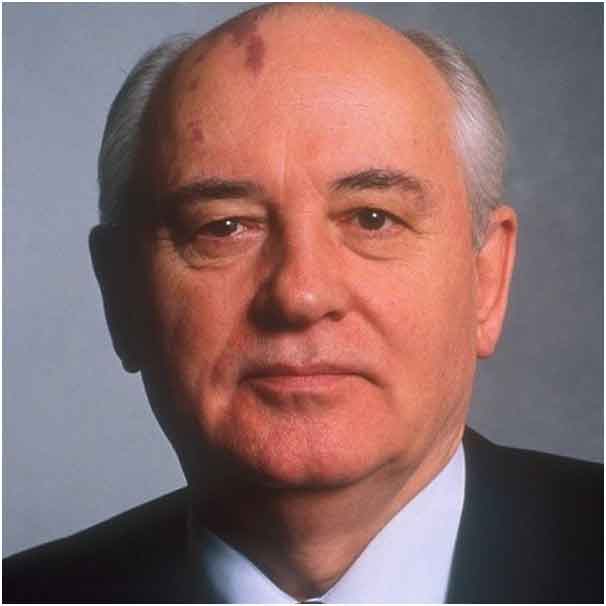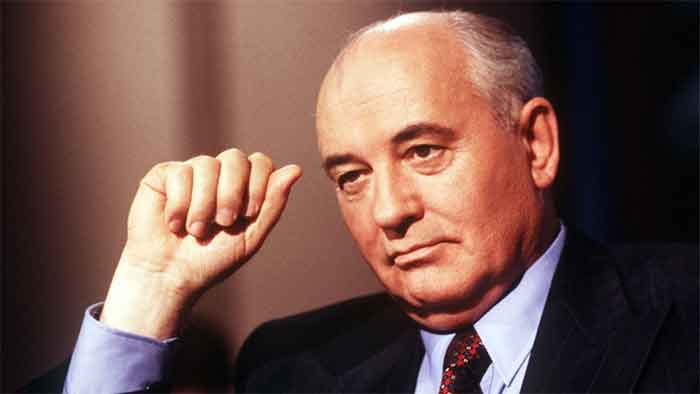
The recent passing of Mikhail Gorbachev triggered memories from the mid-eighties, when as a young communist party activist, I would be constantly confronted with the question, ‘Why are you still fighting for communism? The Soviet Union is being reformed by Gorbachev.’
My retort would be, “In India or elsewhere, we first need to carry out the Russian Revolution. We will try ‘Glasnost’ and ‘Perestroika’ after that. Don’t put the cart (Gorbachev) before the horse (Lenin)!”.
Like so many millions of others who joined the communist movement around the world, I was totally convinced that the revolutions carried out by the Bolsheviks in Russia or by Chairman Mao in China were absolutely essential. With all their failings, I felt these were the only effective ways to fight colonialism, capitalism, fascism, jingoism, feudalism. If anyone was serious about ensuring equality and justice to the world they would have no choice but to work for the socialist revolution.
I was intrigued though at that time by what Gorbachev was attempting as General Secretary of the Communist Party of the Soviet Union – to loosen its grip on the reins of power and allow more public debate and participation. It was impressive and brave but also fraught with tension over how far he could go and the consequences – in terms of the political turmoil the new policies could trigger.
There was euphoria initially from sections of the Soviet population and also much praise from the West. The former was fine but the latter was ominous, as any applause from a bunch of die-hard imperialists and capitalists would be. In the end, Gorbachev presided over the collapse of the Soviet Union, the breaking away of many of its republics, the creation of a unipolar world dominated by the United States – and the world we are living in right now.
So, what are the lessons the Indian communist movement can draw from what he was attempting? Was Gorbachev completely wrong, a naïve fool, a betrayer of the revolution? I don’t think so but more of that later, after I share a bit more of my personal journey in the communist movement.
In the late-eighties, as Tiananmen happened and the Berlin Wall fell, I suddenly dropped out of the party I was with. It all happened in a flash. Till the previous night I had been as loyal a party soldier as any and next morning I woke up as if from a long trance, not feeling very revolutionary anymore. I think there were simply too many unresolved doubts piling up in my head over a long time, when something burst abruptly – like the tire of a speeding car on a hot highway.
Questions about how the Soviet and Chinese systems had concentrated power and resources in the hands of the mightiest states ever built in human history. (And this while Lenin had famously proclaimed the real aim of his revolution was to make the ‘state wither away’).
The ruling communist party, with its monopoly over all policy-making, policing and flow of information, made it impossible to challenge those in power. Well, you could try but very often at the risk of your life or freedom – as millions found out. Yes, the state had socialized the means of production and guaranteed everyone jobs and food but there was no real process or institutions to ensure these claims matched reality or to protest if they didn’t.
Another question was about the internal functioning of the communist party itself. There were only a few who decided everything with the rest following, eyes wide shut. And those who did air doubts were typically branded with abusive labels, silenced and slowly pushed out of the system. Many sincere people who join the movement because of their heads and hearts realize they have no place in the party, which wants to only use their hands and legs – as foot soldiers!
Another doubt was about the way, despite parroting the phrase ‘scientific socialism’ like a mantra, there was no trace anywhere of basic processes of science like carrying out good quality research, presenting and debating evidence or allowing diversity of views to co-exist till a consensus was reached. Most often simplistic slogans passed off as ‘great thought’ and long before George Bush Jr. the communist movement had already declared ‘ Either you are with us or against us’ – no shades of grey were allowed at all.
Instead of science and its culture or methods, what was really worshipped by the Soviet system and its followers worldwide were technological spectacles and industrialism on a gigantic scale. Concerns about ecology or conservation of resources or even simple clean air and water were dismissed as sentimental drivel or even worse – as being ‘anti-science’. (After all, wasn’t it Lenin himself who proclaimed soon after the revolution that ‘Socialism is Soviets plus electricity’?)
Jogging my memory a bit more though, I remember now, my quitting the party was not entirely about such abstract questions. There were also numerous episodes of opportunism, manipulation and sheer dishonesty within the party that broke my confidence in their ability to wield power responsibly. The more I thought about it the more I realized that given absolute control, a typical communist party would end up being tyrannical, not just towards the capitalists but also the very masses they claimed to represent.
One incident in particular comes to mind now. It was the height of the student movement in China, who had occupied Beijing’s Tiananmen square, calling for democratic reforms. Our state-level party conference was in progress when news broke of a group of Chinese students throwing a bucket of paint on the portrait of Mao Tse Tung at the square. One of our senior party leaders on the stage read out the news item and then went into a paroxysm of rage calling for the ‘execution’ of these students. ‘They have no right to live!’ he declared furiously.
Honestly, at that time I was not fully supportive of the Chinese students and their cause or the way they were raising their demands. However, the idea of a death sentence for throwing paint on a portrait was clearly and very frighteningly a lunatic idea. I was barely in my early twenties and could well see myself throwing paint on the great leader’s face if I had been a Chinese student in Tiananmen. (I have a feeling Mao himself would have merely smiled in response). The episode gave me an insight into how political movements, even those with very noble aims and even perhaps a great past, could easily morph into a fanatical religious cult.
I must point out here, since leaving the first party I worked with – which was quite a caricature of communist movement – I have been associated with others too and my experience has been far better. Many members of the parties I have bonded with over the years have been wonderful human beings who genuinely want to change the world for the better. They were and still are people of great courage and integrity and continue to be good friends.
However, the problem really lies with the Leninist party structure, which is based on principles more suited to a military formation than a political one. It is simply too rigid and dictatorial to allow any intelligent thinking, meaningful dialogue or creative action. While one understands that this party structure evolved at a time of great repression and hardships in the early twentieth century, it is not suited anymore for regular political organization or mobilization in most other contexts globally.
Sticking to the archaic party apparatus has strangulated the communist movement by stopping the circulation of good and new ideas within its fold and keeping it alert to changing trends in the world outside. Marxism is a knowledge-intensive political movement and to choke off debate – however painful and difficult- is to kill its essence.
Worse still, like all theological institutions historically, communist movements in many parts of the world have lost their moral compass and even common human decency in many ways (like the Communist Party of Iraq welcoming the US invasion to oust Saddam Hussein, because they hated him more!). The examples of atrocities committed by communist regimes on their own people in the last century are also too numerous to recount here.
The question that the leaders of all communist parties need to ask themselves (or be forced to ask by their party members) is ‘why have communist parties become irrelevant?’ Why are they not growing anywhere, barring a few tiny pockets here and there, where local leaders miraculously still retain their heads and hearts? What happened to their intellectual hegemony or organization on the ground?
And all this especially at a time when the world needs revolutionary movements more than ever before. Obscene concentrations of wealth – both globally and within countries, rampant exploitation of workers and farmers, kleptocratic state bureaucracies, policy-making captured by special interest groups – and of course the rapid rise to power of racist, nationalist and religious fanatical regimes.
Ironically, contemporary Russia under Putin itself is a good example of a country that needs a revolution urgently to thwart his imperial ambitions on behalf of oligarchs, who became rich by looting national resources following the collapse of the Soviet Union. For that matter, China too is ripe for a revolution to break the frightening monopoly of power in the hands of the Communist Party there – while presiding over the second largest capitalist economy in the world!
In India also, the rise of Hindutva fascism requires a revolutionary response – as it cannot be defeated by making concessions of any sort. Nor can it be challenged by the simplistic use of the term ‘fascism’ as a mere swear word, without studying its roots in historical and sociological trends or transformations in the country’s economy and demography.
There is a need also to understand the reasons for the collapse of the country’s left movements over the last several decades, which has given a boost to fascist forces in India. This will require a truly honest appraisal of the Left’s own authoritarian impulses and failure to promote the deepening of democratic institutions, structures and processes, both in the country and within its own fold.
Indian communist parties – for all their genuine achievements – need to give up the idea that they are the fountainheads of all wisdom or morality. Or that they are the only ‘vanguard’ of the Indian revolution. It is an attitude that leads to sectarianism, with no space for any other political movements or ideas. Instead, with great humility, the Indian Left should start working with other forces that are out there opposing fascism in a variety of ways.
At a time when many communist parties have become part of the larger democratic polity and do little more than contest elections – there is also no need to cling on to dead totems and defend the worst phases of communist history from the past. Instead, Indian communist parties should openly and sincerely embrace the principles of democracy (which is not just about contesting elections) themselves in order to recover and build powerful movements, with the participation of the broadest sections of the population.
And finally, going back to Gorbachev, Indian communist parties should perhaps stop sneering at his concepts of ‘Perestroika’ and ‘Glasnost’ or paint him as a ‘renegade’. For all their grand failure, the truth is, they were honest attempts to democratize the Soviet Union. Who could have imagined that opening a few windows to let in some light and air would bring down the entire roof of a mighty superpower?
In fact, the Indian Left should go further and open not just windows, but all its doors too. Warm sunshine and fresh breeze can only benefit both its health and longevity.
Satya Sagar is a journalist who can be reached at [email protected]














































